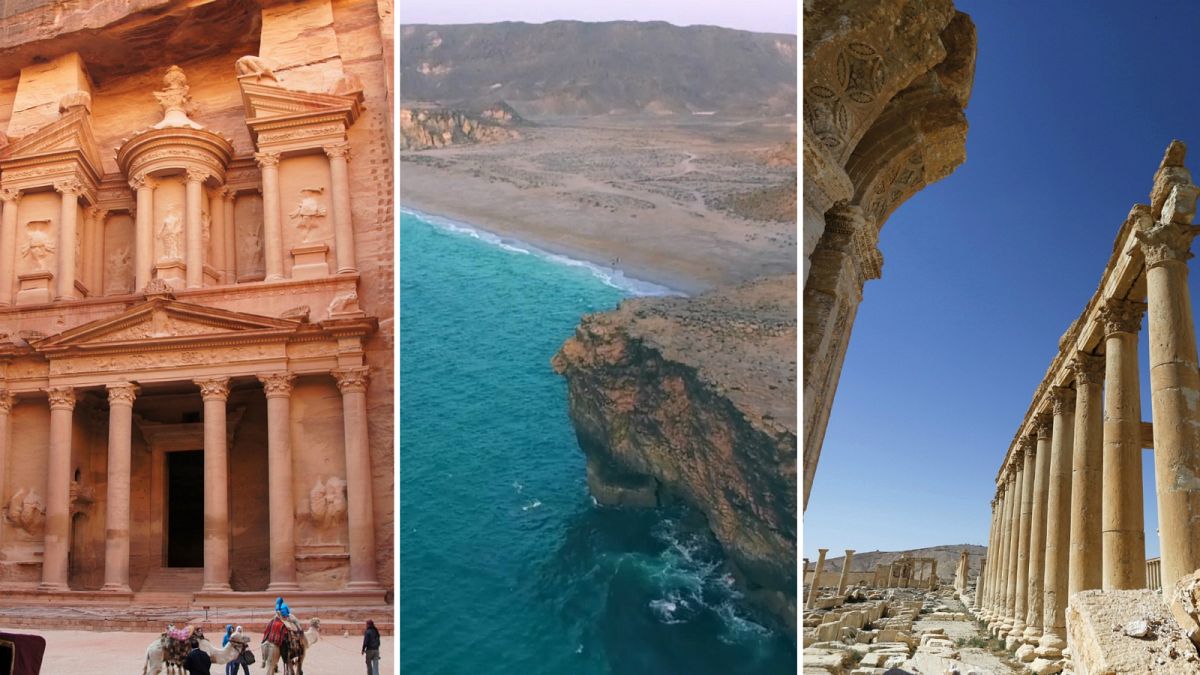The 26th edition of the Arabian Travel Market in Dubai brought together more than 150 countries to showcase their tourism projects.
The 26th edition of the Arabian Travel Market in Dubai brought together more than 150 countries to showcase their tourism projects.
As expected, Middle Eastern countries were well represented on the ground.
Euronews looks at three divergent tourism strategies from the region, from Jordan to Oman and Syria.
JORDAN: INVESTING IN INFLUENCERS
Home to the ancient site of Petra, inbound visitors to Jordan spent an estimated $4.64 billion in 2017, according to the latest report by the World Tourism Organisation. This ranks the country as one of the most popular destinations in the Middle East.
According to the managing director of Jordan’s Tourism Board, Dr. Abed Al Razzaq Arabiyat, inviting social media influencers to visit the kingdom is a key part of their strategy going forward.
“We can see that when the influencers came to Jordan and lived the experience - shared their experiences within their own platforms - it created demand,” he said.
“Definitely the cost effective way [to market], is social media and online platforms, where you can have reach and exposure of the content,” he added.
Opening up low cost carrier routes - especially via Europe - is also boosting tourist numbers to the destination, according to the ministry.
The Tourism Board’s managing director also went on to say that ploughing more funds into the industry was essential for the country to cope with a recent surge in visitor numbers.
“The challenge now, is that we need more investment in Petra,” said Arabiyat, “We need more hotel rooms - and also in Wadi Rum, the Dead Sea and Aqaba.”
Of late, the Jordanian government has granted tax exemption status to tourism projects and developments, which Arabiyat hopes will help attract foreign and domestic investment and further expand the sector.
OMAN: TARGETED MARKETING
Like many of its Gulf neighbours, Oman is seeking to be less reliant on oil revenues and diversify its economy by developing sectors like tourism.
According to Salem Al Mamari, Director General of Tourism Promotion in Oman, the efforts are focused on bringing in travellers with an appetite for nature, culture and adventure.
Al Mamari said that last year’s numbers were positive, with “$1.5 billion pumped into the national economy by tourism.” He added that 2019’s figures are expected to be even higher and that job creation within the sector was on the rise.
Oman’s strategy differs from many other Gulf countries, who are investing in widespread advertising campaigns to attract the maximum number of visitors.
Al Mamari said that whilst everyone is welcome to visit the Sultanate, preserving the country’s natural beauty was the ministry’s priority. He said this would be successfully achieved in the long-term through targeted marketing.
“We believe that, what we have now has to live for generations to come. Mass tourism is not in our calendar. We are working with the people who are in a position to help us maintain, to keep and to preserve Oman as it is - for the people to continue to come in the future.”
SYRIA SAYS COME VISIT
For the first time since 2011, Syria was represented with a stand at the Arabian Travel Market.
Known for the ancient sites of Palmyra and Krak des Chevaliers, the country is trying to regain lost ground in the tourism space.
With security being a major concern for travellers, Syria’s Ministry of Tourism is trying to send a message that the hospitality sector is up and running again.
“It is safe for all the people to go around, to have visits, to see all the great attractions of tourism and to visit again,” said Ziad Balkhi, the Ministry’s director of Information Communication Technology.
“Please see for yourselves…see the good Syrian people who don’t want war. They want peace - we want peace - and this is what we're trying to promote all the time.” he added.
Whilst some landmarks are still visibly damaged by war, Balkhi was keen to reassure those who haven't yet visited the country that there was much to engage and inspire them.
“The whole of Damascus, the south, Busra - all the great attractions of the west coast…it's all there for travelers to come,” he said.
In business terms, Balkhi told Euronews that the general response to Syria’s presence at ATM had been encouraging.
“It was actually amazing,” he said, “I have seen a lot of people…tour operators coming. “Now we're starting to receive business inquiries and business requests. It was a great opportunity for us.”
